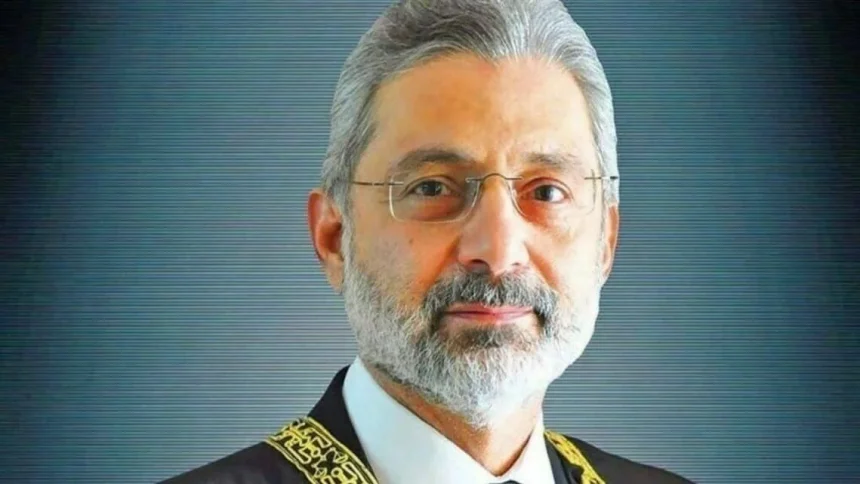Chief Justice of Pakistan Justice Qazi Faez Isa has made it clear that he won’t have his service tenure extended beyond the mandatory retirement age, and it took two senior ministers to convey his stance to the public.
On separate occasions, Prime Minister’s Adviser Rana Sanaullah and Federal Minister for Law Azam Nazeer Tarar again dispelled the rumors surrounding the ‘possible’ extension to the chief justice, adding that it was inappropriate to say that he desired to stay in office a little longer.
Talking to a private news channel, Rana Sanaullah said that Justice Qazi Faez Isa had communicated his decision during discussions with key government figures, including law minister and Attorney General of Pakistan Mansoor Awan. However, he said top judge was open to any such extension that was uniformly applicable to all, rather than tailored for specific individuals.
Explaining the government’s position on the matter, he said his party – the Pakistan Muslim League-N – lacked the parliamentary majority required to amend the constitution for such a move. He said that only the parliament had powers to amend the constitution. He said that there was no political consensus, so the amendment was also not being considered at the moment.
During an event in Islamabad, Azam Nazeer Tarar was asked to comment on reports suggesting that the government might introduce a judiciary-specific legislation in the parliament to extend the top judge’s service tenure. He categorically denied the reports, saying that Justice Qazi Faez Isa had ‘no interest’ in continuing beyond his mandated retirement, and would be leaving his office next month. He urged the media to move on from the ‘unnecessary’ topic.
The minister said that Justice Qazi Faez Isa was a respectable person, so it was inappropriate to keep the rumor mill churning, especially when the top judge had already cleared his position on the matter. However, he made it clear that the principle of seniority would be followed. According to the seniority list, Justice Mansoor Ali Shah is next in line, so he is likely to become the next top judge.
It is pertinent to mention here that Justice Qazi Faez Isa has built a reputation over the years for his strict adherence to the constitution. On the other hand, a bill was tabled in the Senate, aimed at amending the Supreme Court (Number of Judges) Act, 1997, to increase the number of judges in the apex court from 17 to 21, excluding the chief justice.
The bill was introduced by Senator Mohammad Abdul Qadir, who argued that more than 53,000 cases were currently pending in the Supreme Court, which necessitated the addition of more judges. He called for appointing at least 16 new judges to manage the constitutional and financial cases involving billions of rupees, adding that the court currently lacked the capacity to hear them promptly.
However, several senators opposed the bill, calling it politically motivated. Senator Syed Ali Zafar went on to describe it as an attempt to impose a ‘judicial martial law’. He suggested that the government should instead take steps to strengthen the lower courts. However, Azam Nazeer Tarar backed the bill. He said there was a huge backlog of cases, several of whom – including those involving capital punishment – had been awaiting verdicts for years.
He pointed out that the constitution did not mention anything about setting the limit with regard to the number of judges. Some senators questioned timing of the bill, fearing that the increased judicial strength could be misused. The minister for law tried to address all those concerns, but his reasons were met with dead ears. The bill was then referred to the relevant committee for further deliberation.












